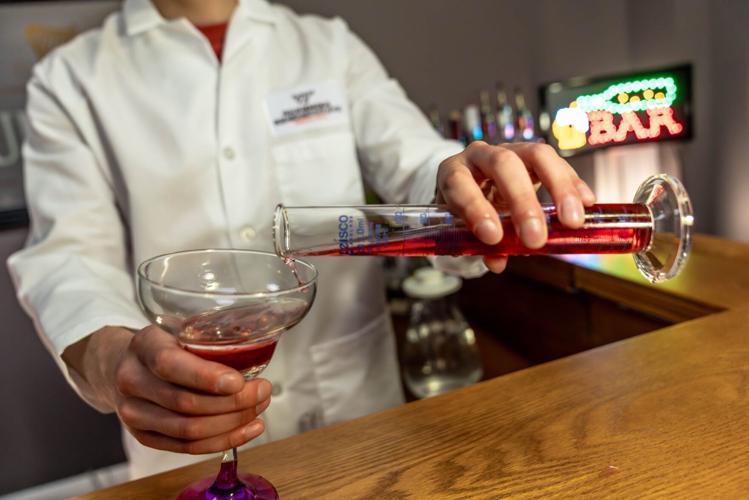
Fralin Biomedical Research Institute researchers found that after a cocktail, study participants taking medications for diabetes and weight loss saw delayed effects from alcohol. (Clayton Metz / Virginia Tech via SWNS)
By Stephen Beech
Slimming drugs Ozempic and Wegovy may also help people cut down on booze, according to a new study.
People taking the pills prescribed for diabetes management and weight loss may experience delayed effects after drinking alcohol, say American scientists.
The research showed that semaglutide drugs, known as GLP-1 agonists, slow the speed at which alcohol enters the bloodstream, which also slows the effects on the brain.
Long-term chronic boozing is linked with health issues including high blood pressure, cancer and liver disease.
The pilot study, published in the journal Scientific Reports, was conducted by scientists at Virginia Tech's Fralin Biomedical Research Institute (FBRI).

Wikimedia Commons
Corresponding author Dr. Alex DiFeliceantonio said: “People who drink know there’s a difference between nursing a glass of wine and downing a shot of whiskey.
"A standard serving of either has 0.6 ounces of alcohol, but the shot brings a rapid increase in blood-alcohol content. It feels different because of the way the body handles alcohol over time.
“Why would this matter? Faster-acting drugs have a higher abuse potential. They have a different impact on the brain.
"So if GLP-1s slow alcohol entering the bloodstream, they could reduce the effects of alcohol and help people drink less.”
Despite drinking similar doses of alcohol calculated to increase breath alcohol concentration to around 0.08%, concentration increased more slowly in study participants taking semaglutide, tirzepatide, or liraglutide.
Participants in that group also reported feeling less intoxicated on subjective measures.
Researchers wanted to better understand the physical and subjective experience of alcohol traveling through the body of someone taking a GLP-1.
They say the study provides important data to guide the design of larger, more rigorous studies testing whether GLP-1 drugs can help reduce alcohol use.
The researchers recruited 20 participants with a BMI of 30 or greater, half on a maintenance dose of GLP-1s and half taking no medication.
Participants fasted before arriving for the study, then they were given a snack bar to standardise calorie intake and stomach contents.

Dr. Alex DiFeliceantonio was the lead author of the study. (Clayton Metz / Virginia Tech via SWNS)
The research team gathered blood pressure, pulse, breath alcohol concentration, and blood glucose levels.
Ninety minutes later, participants were served an alcoholic drink that had to be consumed within 10 minutes.
Researchers then measured breath alcohol and participants answered questions about cravings, appetite, alcohol effects, and taste. For example, they were asked to rate, on a scale of zero to 10, “How drunk do you feel right now?”
That was repeated three times over 60 minutes.
The participants on GLP-1s consistently reported feeling less intoxicated.
Following the session, participants remained in a recovery room as the alcohol was metabolised.
Breath alcohol levels were measured every 30 minutes, blood glucose was measured twice, and three hours after the session, participants again answered subjective questions.
After four hours, a breath alcohol content below 0.02%, and the study physician’s approval, the participant was allowed to leave.
Dr. DiFeliceantonio, interim co-director of the FBRI, said: “Other medications designed to help reduce alcohol intake - naltrexone and acamprosate — act on the central nervous system.
“Our preliminary data suggest that GLP-1s suppress intake through a different mechanism.”
She says the drugs slow gastric emptying, which can lead to a slower rise in blood alcohol.

(Clayton Metz / Virginia Tech via SWNS)
The study built on an analysis of social media posts on the community network Reddit, in which users reported reduced cravings for alcohol when taking drugs intended to treat diabetes and obesity.
Dr. DiFeliceantonio said: "Using a drug that’s already shown to be safe to help people reduce drinking could be a way to get people help fast.”
While it was a pilot study, the research team said their findings showed "clear differences" between groups and provide data that support larger trials testing the drugs as a therapy for people who want to reduce their drinking.
Study first author Dr Fatima Quddos added: "The possibility of offering new hope to individuals struggling with addiction is what makes this work so meaningful.”
























(0) comments
Welcome to the discussion.
Log In
Keep it Clean. Please avoid obscene, vulgar, lewd, racist or sexually-oriented language.
PLEASE TURN OFF YOUR CAPS LOCK.
Don't Threaten. Threats of harming another person will not be tolerated.
Be Truthful. Don't knowingly lie about anyone or anything.
Be Nice. No racism, sexism or any sort of -ism that is degrading to another person.
Be Proactive. Use the 'Report' link on each comment to let us know of abusive posts.
Share with Us. We'd love to hear eyewitness accounts, the history behind an article.